AHMADIYYA GRADUATES NINE MISSIONARIES
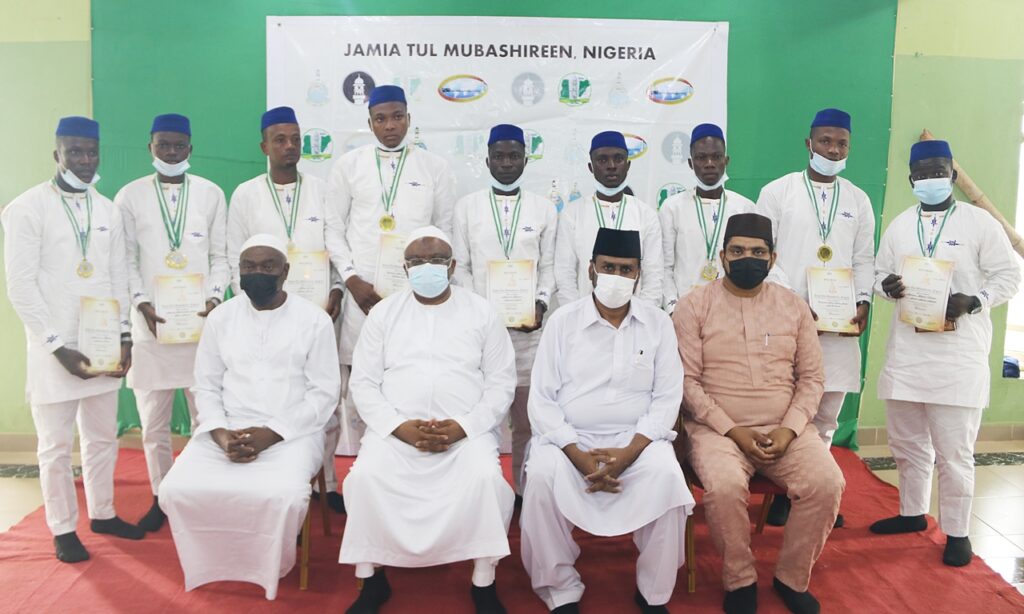
The Ahmadiyya Muslim Community, Nigeria Branch has graduated nine (9) Missionaries at its School of Theology (Jamiatul-Mubashireen) located at Ilaro, Ogun State. The graduands who had successfully completed their four-year programmes comprised of five (5) Nigerians, three (3) Beninoise, and one Cameroonian. Their names are Adeyemi Habeebullah (Nigeria), Apooyin Abdulroqeeb (Nigeria), Gongola Abbas (Nigeria), Badrudeen Abdul Azeez (Nigeria); Ajakaye Mujtaba (Nigeria); Hafiz Ayeroumi Abdul Kabir (Benin Republic); Hafiz Ibrahim Shafii’ (Benin Republic); Isa Alabi Mustapha (Benin Republic) and Nuhu Yusuf Baba (Cameroon). Alhaji Alatoye Folorunso Azeez, the National Head of Ahmadiyya Muslim Jama’at of Nigeria who was the Chairman of Convocation Ceremony enjoined the newly graduated Missionaries to live up to expectation by displaying attributes and characters of a true reformer. Barrister Alatoye also urged the new Missionaries to always upgrade themselves morally and educationally by making researches and professing solutions to world crises. He added that it can only be possible through fervent prayers. “Today, I congratulate you all on your well-deserved convocation ceremony after four years of rigorous training at Jamiatul-Mubashireen. You have all chose to be reformers, therefore you should always display good attributes of reformers. Your work is a blessed and professional one. It has both worldly and divine rewards. You are on the track to teach the people to be Godly.” “Missionaries are researchers. You are expected to research on lasting solutions to the challenges facing the world. You must then support your solutions with prayers.” “You must preach with the goodness of your behaviors. Also train and retrain yourselves to be better. Always follow the right path and guard against evils from money and women. Above all, go to the field to reform the people with good characters and prayers,” the Amir stated. The National Head also sounded a note of warning to Jamia students generally in respect to the rules and regulations of the institution. His word: “The aim of the institution is to produce reformers of good repute and proud ambassadors of Ahmadiyya Community. Any candidate coming to Jamia must be steadfast, God-fearing and upright. We can’t afford to produce unfit missionaries to the society.” “When you are opportuned to be in Jamiatul-Mubashireen, do not attempt to violate the rules and regulations, the punishment is very stiff. Please follow all the rules guiding the institution.” The Acting Missionary Incharge, Maulvi Abid Abdul Waasi enjoined graduands to always request His Holiness for prayers and seek for his guidance on all their daily routines. Certificates of Excellence were later given to the graduating students. Academic and sporting event prizes were also presented to outstanding students. Prominent among the guests include the National leader Majlis Ansarullah Ahmadiyya Nigeria (Elders’ Forum of Ahmadiyya Community), Alhaji Abdul Waheed Adeoye and National leader Majlis Khuddamul Ahmadiyya Nigeria (Youth Wing), Dr. Sanni Taofeeq.
ALHAJI OWOLABI ELECTED AS CHAIRMAN NCRIB

Alhaji Abbas Owolabi has emerged the Chairman Nigeria Council of Registered Insurance Brokers (NCRIB) Abuja Chapter. Based on his contributions to the body over the years, his experience cum dexterity in the profession, Alhaji Owolabi was unanimously elected as the head of the body, succeeding Mr. Lateef Omoladun whose tenure expired earlier in the year. NCRIB was founded in 1962 and incorporated in 1967 as a non-profit making organization backed by Act 2003. Its aims and objectives is to maintain central organization for all insurance brokers in Nigeria, watch over legislation, afford means of arbitration on, or for settling disputes, collaborate with government and various institutions and professional bodies, organise conference, seminars and workshops for insurance brokers as well as formulate standard of practice and conduct of members. The new chairman whose company – Hansworth M.A. Insurance Brokers Ltd., registered with NCRIB since 2001 had earlier served as the Vice Chairman for two consecutive terms. Alhaji Owolabi promised to lift the body to greater heights and therefore solicit support from all and sundry to actualise the dream. “My plan as the Chairman is to improve on the relationship with the insuring public by organising road walk to sensitize the public, radio and television shows. I also plan to improve on the I.T. skills of our members as well as improving the general welfare of our members by effecting certain policies on insurance,” Alhaji Owolabi noted. Alhaji Owolabi is an active, dedicated, and responsible member of Ahmadiyya Muslim Jama’at of Nigeria, Abuja Branch. He was formerly the Abuja President of the Branch.
REMINISCING MY QADIAN JALSA EXPERIENCE

Maulvi Nurudeen Okubena By the special grace and mercy of the Almighty Allah, I was privileged to attend the 2018 Jalsa Salana Qadian, India. It was actually my first presence and experience in Qadian, the birthplace of Hazrat Mirza Ghulam Ahmad (as), the Promised Messiah and founder of the worldwide Ahmadiyya Muslim Community. As an African Missionary leaving the shores of Africa for the first time, I was filled with happiness and a great aspiration to see Qadian. On arriving at Qadian after a journey of several hours on road from New Delhi, and despite witnessing such cold weather for the first time in my life, the sight of Qadian was indeed pleasing and I was more pleased when I saw more than thirty (30) fellow Africans at the Conference with a very high spirit and great enthusiasm to participate in all the Jalsa proceedings. I was exceptionally marvelled with the spirit of brotherhood at the Jalsa and, most especially, with the high spirit of sacrifice displayed by the workers at the Convention. Both the young and old were always ready to offer every sacrifice for the comfort of the guests of the Promised Messiah (as). The volunteers on security duties were always there at every moment, even in the extreme cold of the night. May Allah reward them all abundantly. One great thing about Qadian was that everyone meets each other with cheerfulness and happiness. Most especially when some of our Indian/Pakistani brothers realised that an African Missionary, like myself, could speak and understand the language of the Promised Messiah (as); they all showed great love and affection. Another wonderful scenario I witnessed at Qadian was that, despite the extreme cold weather, you would find people very early in the dawn trooping in large numbers to participate in the Tahajjud (the supererogatory night Prayer). I could remember that while there, I tried on so many occasions to observe prayers at the Mubarak Mosque but, on every occasion, I was told the place is filled up. However, I eventually had the opportunity to do so. Alhamdulillāh! It was indeed pleasing to have the opportunity to pray at Baitu Dua, Baitul fikr and several other rooms of the Promised Messiah (as). One surprising fact is the enthusiasm and zeal in every attendee to get an opportunity to pray in these holy rooms, and one could see a feeling of contentment and conviction of acceptance of prayers in the countenance of everyone who had had the opportunity of praying there. While in Qadian, considering the distance we traversed to reach there, one thing that always struck my mind was how the message of the Promised Messiah (as) was able to spread from such a remote village to the entire world. This, therefore, further strengthened my conviction that he, indeed, was a Chosen One of the Almighty Allah. Another striking thing about Qadian is the feeling of tranquillity one experiences while there. One always feels secured in Qadian. And, even, adherents of other faiths who live nearby do how high level of love and affection to all Jalsa attendees. Also, witnessing the presence of the attendees at Jalsa who have traveled from different parts of the world, I could see the fulfilment of the prophecy vouchsafed to the Promised Messiah that: يأتيك من كل فج عميق That is, “He shall come to you from every far region.” I was able to meet people from virtually all the continents of the world and everyone displayed a great level of love for the other. I was extremely pleased with the various speeches at the event. The facilitators were versatile and learned and the speeches were really soul inspiring. Qadian is a place to be visited by all, to experience the bounty and favours bestowed by Allah to the Imam of the Age. May the Almighty Allah give us all the grace to do so. Aameen Maulvi Nurudeen Okubena Head of Programming, MTA Africa, Nigeria Studios
AHMADIYYA NIGERIA HEAD BAGS GLOBAL AWARD

By Aliyu Usman The International Chartered World Learned Society, a worldwide independent organization, self-governing, pan-discipline educational charity with one of its aims to provides public benefits including expert scholars’ advice on a variety of public issues related to sciences, engineering, health sciences, arts, humanities, social sciences and so on has seen Alh (Barr) Alatoye Folorunso Azeez the current Leader of Ahmadiyya Muslim Jamaát in Nigeria as worthy of its international award. Alatoye Folorunso Azeez was honoured with the Golden Award as “the most Notable and Top Distinguished Leader of the 21st Century” by the International Chartered World Learned Society, a United States-based organization, with offices in Africa, Asia, Europe, and Oceania. He has also been conferred with the Life Fellowship of the Society in the field of Law, Accounting, and Taxation. While conferring the award on Alh (Barr) Alatoye Folorunso Azeez, the World Grand President of the Society, UNESCO Laureate Prof. Sir Bashiru Aremu, noted that the recognitions were based on Alh (Barr) Alatoye Folorunso Azeez’s immense contributions to the global knowledge industry in particular in the area of Law, Accounting, Taxation and religion of Peace. The insignia of the awards included certificates, Golden Frame, a muffler, a golden medal, a plaque and other instruments of the Society which were presented in recognition of “the avocation, enthusiasm, and reputation” of the honouree. While congratulating Alh (Barr) Alatoye Folorunso Azeez on behalf of the World Grand Board of Directors, ICWLS, including Prof. Sir Sarfraz Lloyd of Oceania, Prof. Sir Abhiram Kukshreshtha of Asia, Prof. Sir M. Howard Pilley of Europe and Prof. Sir Luis Emilio Abad of the Americas, Prof. Aremu urged the recipient not to relent in his efforts of adding value to humanity. According to Fellow of Cambridge Scholar Publishing, UK, the UNESCO Laureate, Prof. Sir Bashiru Aremu, who is also the Vice Chancellor Crown University Int’l Chartered Inc, Santa Cruz, Argentina, world partners, and constituent campuses and online programs described Alh (Barr) Alatoye Folorunso Azeez as a shining example of diligence, excellence, and competence from whom the present and future generations will continue to draw inspiration and emulate as well. While responding to the presentation of awards, Alh (Barr) Alatoye Folorunso Azeez appreciated the World Grand President and the ICWLS World Grand Board of Directors for deeming him worthy of the honour. He stressed that he considered the honour on behalf of his family, Muslim, Ahmadiyya Muslim Community worldwide that he is currently serving as one their Leader in Nigeria apart from being Lawyer and Chartered Accountant. He also expressed willingness to leverage the membership of the consortium in achieving the tripartite mandate of his new incoming university (Proposed Minaret University in Nigeria ) viz teaching, research, and community service. Prof. Aremu said, “Alhaji (Barr.) Alatoye Folorunso Azeez, HND, BL, LLB, FCTI, FCA, FNIM. FSM, ACIArb, is the Amir of the Ahmadiyya Muslim Jama’at Nigeria from 1 July 2019 to date. Prior to that, he was the Naib Amir, South West Region of Nigeria. “He had served in various positions such as the National Secretary Maal, National Internal Auditor, National Ameen. He had also served as the Vice-Chairman, Humanity First Nigeria, Naib Jalsa Officer, and Secretary Nusrat Jehan Board Nigeria at one time or the other. “Azeez Alatoye is a Senior Partner of Ascension Consulting Services. He has responsibility for the Business Development, Operational Excellence, and Practice Management of the Firm. Azeez is a: “Barrister & Solicitors of the Supreme Court of Nigeria & member of the Nigerian Bar Association. Fellow of the Institute of Chartered Accountants of Nigeria Fellow of the Chartered Institute of Taxation of Nigeria & A Chartered Tax Practitioner Fellow of the Nigerian Institute of Management); and Associate Member of the Chartered Institute of Arbitrators, UK. Bachelor of Law Degree holder from the University of Bradford UK Holder of Higher National Diploma in Accountancy, Kwara State Polytechnic, Ilorin. Ordinary National Diploma, Polytechnic of Ibadan. “He trained with Z.O. Ososanya (HLB International) in 1993 before joining Coopers & Lybrand (C&L) in 1994. With the merger of C&L & Pricewaterhouse in 1998, Azeez joined PricewaterhouseCoopers in July 1998 and rose to the level of Senior Manager in July 2005. “In September 2005, He joined Akintola Williams Deloitte where he worked as a Senior Manager in the Oil & Gas, Tax Advisory & Regulatory Services, West African Operations until 30 June 2007. “In July 2007, Azeez was admitted as a Partner in Ernst & Young to head the Energy, Chemical & Utilities Tax Sub Unit & Business Tax Compliance Services for West Africa. This he did up to June 2009. “On 1 July 2009, Azeez, with two other senior colleagues co-founded Saffron Professional Services where he was the Chief Operations Officer (COO) and Oil & Gas and Solid Minerals Tax Partner, the position he held up to 31 July 2012, with any others”, he said. Prof. Aremu said, ” Alhaji (Barr.) Alatoye Folorunso Azeez, HND, BL, LLB, FCTI, FCA, FNIM. FSM, ACIArb, is the Amir of the Ahmadiyya Muslim Jama’at Nigeria from 1 July 2019 to date. Prior to that, he was the Naib Amir, South West Region of Nigeria. “He had served in various positions such as the National Secretary Maal, National Internal Auditor, National Ameen. He had also served as the Vice-Chairman, Humanity First Nigeria, Naib Jalsa Officer, and Secretary Nusrat Jehan Board Nigeria at one time or the other. “Azeez Alatoye is a Senior Partner of Ascension Consulting Services. He has responsibility for the Business Development, Operational Excellence, and Practice Management of the Firm. Azeez is a: “Barrister & Solicitors of the Supreme Court of Nigeria & member of the Nigerian Bar Association Fellow of the Institute of Chartered Accountants of Nigeria Fellow of the Chartered Institute of Taxation of Nigeria & A Chartered Tax Practitioner Fellow of the Nigerian Institute of Management); and Associate Member of the Chartered Institute of Arbitrators, UK. Bachelor of Law Degree holder from the University of Bradford UK Holder of Higher National Diploma in Accountancy, Kwara State
MINARET UNIVERSITY FOUNDATION STONE FINALLY LAID
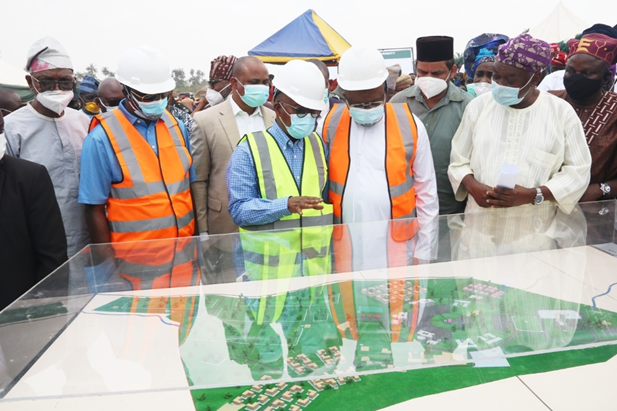
With the gracious approval and blessings of its Supreme Head, Hadhrat Khalifatul Masih V, the Ahmadiyya Muslim Community has eventually laid the foundation stone of the Minaret International University, Ikirun, Osun State. The much-anticipated foundation stone laying was performed by the Executive Governor of Osun State, Alhaji Adegboyega Isiaka Oyetola, witnessed by top dignitaries including government officials, traditional rulers, and personalities across the country. Recall that the organization had embarked on the University Project in 2017 with the processing of Certificate of Occupancy (C of O) and documentation with the National Universities Commission. The Ahmadiyya Muslim Community known to be a pioneer of Muslim education in Nigeria intends to establish a world-class tertiary institution for the intellectual and manpower development of human resources for sustainable socio-economic development nationally, regionally, and internationally. The University will also focus on environmentally sustainable growth and development of all aspects of agriculture, energy and transportation infrastructure, water and natural resources manufacturing and processing, management sciences, engineering, communication technology, humanities as well as scientific and technological research relevant to global development problems and challenges. Governor Oyetola lauded Ahmadiyya Community for its roles in educational development as well as humanitarian services within the country and across the globe. He believed education and religion are timeless and potent instruments for the development and transformation of society. “The expediency of these two tools is even more compelling today that the society requires moral and ethical rebirth. It is therefore heartening that Minaret International University is combining religion and education to build the character of our youths and help them to acquire knowledge to deliver the future that we desire. “Our Administration considers education and good moral standing as essential tools for building leaders of tomorrow and ensuring sustainable development. In line with the belief of the State that government cannot solely provide the education the State needs, successive governments have encouraged willing individuals and groups to establish schools at all levels. Consequently, Osun is home to top-notch tertiary institutions that are making their contributions to the development of the State and the nation. “The establishment of Minaret International University is a welcome addition to this family. As a notable knowledge-seeking and religion-savvy institution known for its tradition of excellence, I have no doubt that Ahmadiyya Muslim Jama’at will build a University that is a Centre of excellence in deed and in truth. I am also persuaded that the organization will produce graduates who will be problem solvers and job creators. “Ahmadiyya Muslim Jama’at of Nigeria has proved over the years to be a frontline Muslim organization in the propagation of the Islamic faith. It has also demonstrated an irredeemable commitment to the peace, progress, and welfare of the people and State of Osun and the nation. These contributions are traceable to the visionary leadership of the organization. “On behalf of the Government and people of Osun, I appreciate the leadership of this notable organization for its services to humanity and the decision to site this University in Osun, which will further expand access to tertiary education and also contribute to the development of our State,” the governor added. The Amir (National Head) of the organization in Nigeria, Barr. Alatoye Folorunso Azeez, in his address, heartily appreciated the good support and neighborliness of the State government and the host Community towards the success of the foundation stone laying event. “We are most grateful to the host Community of Ikirun, the immediate past Akirun of Ikirunland, His Royal Majesty, Late Oba Abdul Rauf Olawale Adedeji II, and the Osun State Government for the strong support to the actualization of this dream. Most importantly, we are very grateful to His Holiness, the worldwide Head of Ahmadiyya Muslim Jama’at for his kind approval of the University to be sited at Ikirun in Osun State. “MIU is owned by 215 Countries where Ahmadiyya Muslim Community has been formally established. It is the first of its kind globally, innovative University with a difference designed to promote academic excellence, moral discipline, and the spirit of selfless service for the advancement of socio-economic development, the emancipation of the people, and commitment to global cooperation for development and unity of humanity. “The philosophy of MIU is to guard against alcoholism and drug addiction, ensure banishment of cultism, embrace theory and practical/work approach, practical entrepreneurship training, embrace sports, physical fitness and martial arts and strict enforcement of moral discipline. The tuition fees will be moderate and affordable for brilliant students,” Barr. Alatoye stated.
Majlis Khuddamul Ahmadiyya Nigeria have Honour of Virtual Meeting with World Head of Ahmadiyya Muslim Community
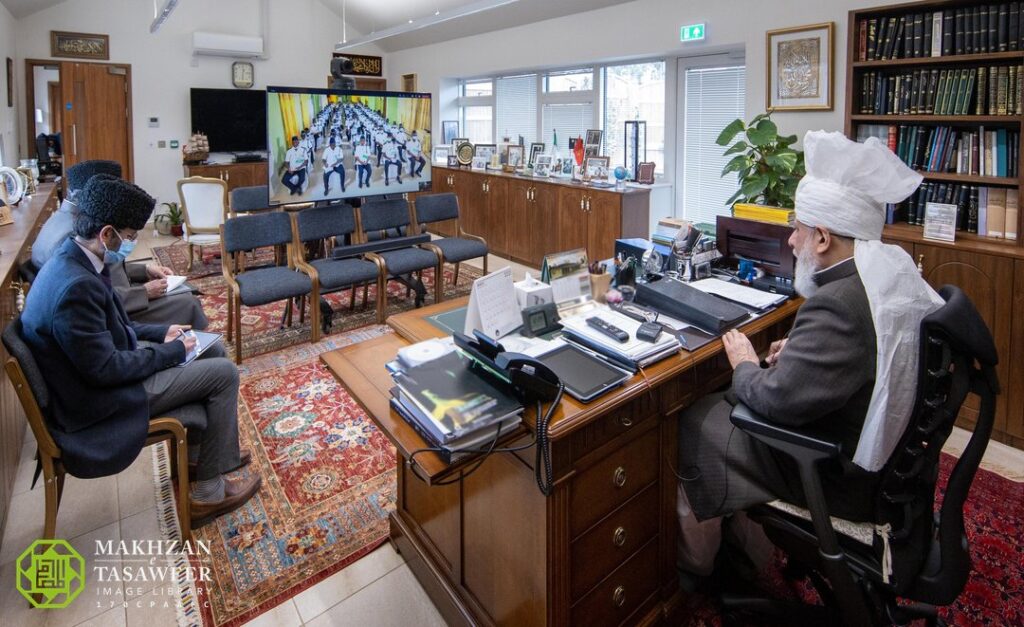
The National Amila of Majlis Khuddamul Ahmadiyya have an official meeting with His Holiness On 7 March 2021, the World Head of the Ahmadiyya Muslim Community, the Fifth Khalifa (Caliph), His Holiness Hazrat Mirza Masroor Ahmad held a virtual online meeting with the National Amila (Executive) of Majlis Khuddamul Ahmadiyya Nigeria (Ahmadiyya Muslim Youth Auxiliary), as well as regional Qaideen. His Holiness presided the meeting from his office in Islamabad, Tilford, whilst the Amila members joined the meeting virtually from the Lajna Hall in Ojokoro in Lagos, Nigeria. During the 40-minute meeting, all present had the opportunity to speak to His Holiness and the National Amila members were able to present a report about their respective departments and to receive the guidance and instructions of His Holiness on a range of issues. As the meeting concluded, His Holiness emphasised the importance of devising comprehensive plans to assist with the moral and spiritual enhancement of the members of Majlis Khuddamul Ahmadiyya. Hazrat Mirza Masroor Ahmad said: “All your Mohtamimeen (National Secretaries) should study the constitution of Majlis Khuddamul Ahmadiyya and see exactly what their duties are. Thereafter, you should make your plans according to the constitution. In your next Amila meeting you must analyse what are the shortcomings of your work and where you must strive to improve. So make a countrywide plan and then work hard to achieve your targets.”
Lajna Imaillah Nigeria have Honour of Virtual Meeting with World Head of Ahmadiyya Muslim Community
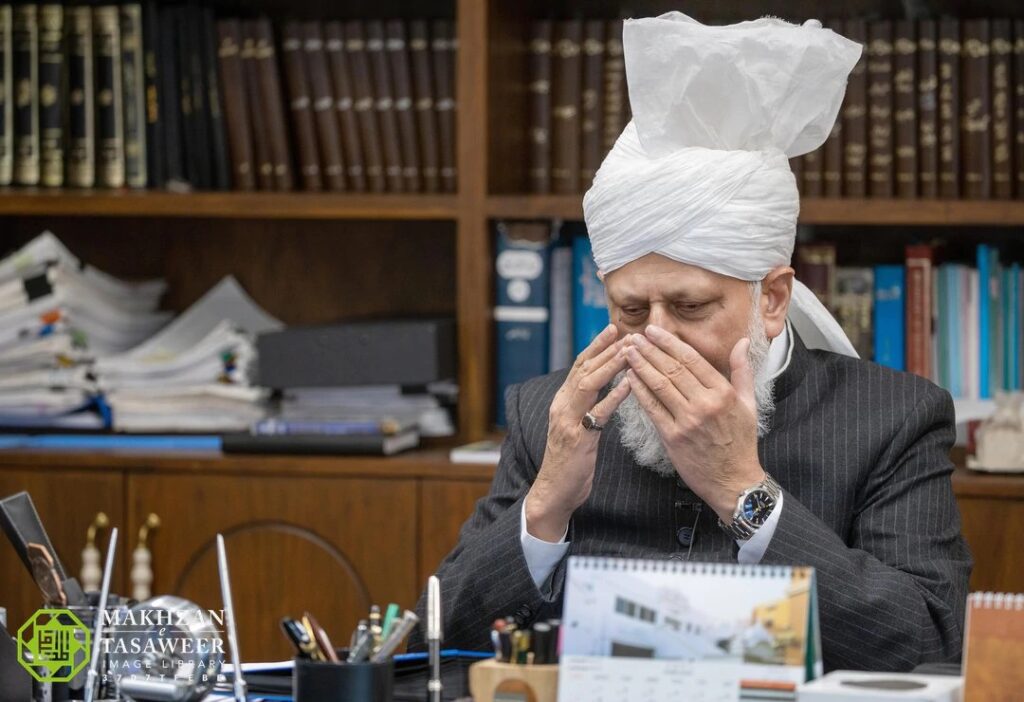
Encourage every girl to get higher education” – Hazrat Mirza Masroor Ahmad On 21 February 2021, the World Head of the Ahmadiyya Muslim Community, the Fifth Khalifa (Caliph), His Holiness Hazrat Mirza Masroor Ahmad held a virtual online meeting with members of the National Amila (Executive) of Lajna Imaillah Nigeria (Ahmadiyya Muslim Women’s Auxiliary). His Holiness presided the meeting from his office in Islamabad, Tilford, whilst the Amila members joined the meeting virtually from the Lajna Hall in Ojokoro in Lagos, Nigeria. During the meeting, His Holiness outlined the various responsibilities assigned to the respective Lajna Amila members and gave guidance on improving the activities of their departments. Speaking to the Secretary Nasirat, responsible for the moral and spiritual training of girls up to the age of fifteen, His Holiness said that their department should keep a good record of how many girls are engaging and taking part in the initiatives that were being run by the national department. His Holiness also encouraged exercise and instructed the Secretary Sehat-e-Jismani, responsible for Health and Fitness, to ensure that the Amila members should lead by example and exercise regularly. During the meeting, the Secretary Sanat-o-Tijarat, responsible for Trade and Industry, showed some of the products that the Lajna Imaillah members from across the country had made, such as bags and other items. The secretary highlighted that the Lajna Imaillah members are being assisted in making a living and are being supported in starting their own businesses. They had also assisted local society during the Covid-19 pandemic. Later in the meeting, reiterating the importance of gaining higher education, Hazrat Mirza Masroor Ahmad said: “Encourage every girl to get higher education.” As the meeting concluded, His Holiness outlined his expectations of Lajna Imaillah. Hazrat Mirza Masroor Ahmad said: “You have a huge task in front of you and I hope Lajna can achieve it and if you do, it will also encourage the men to be more active. You have to push them! My expectations with Lajna are more than the men. So I hope you fulfil my expectations. May Allah the Almighty bless you in every respect. Allah bless you all.”
National Majlis-e-Amila in Nigeria have Honour of Virtual Meeting with World Head of Ahmadiyya Muslim Community
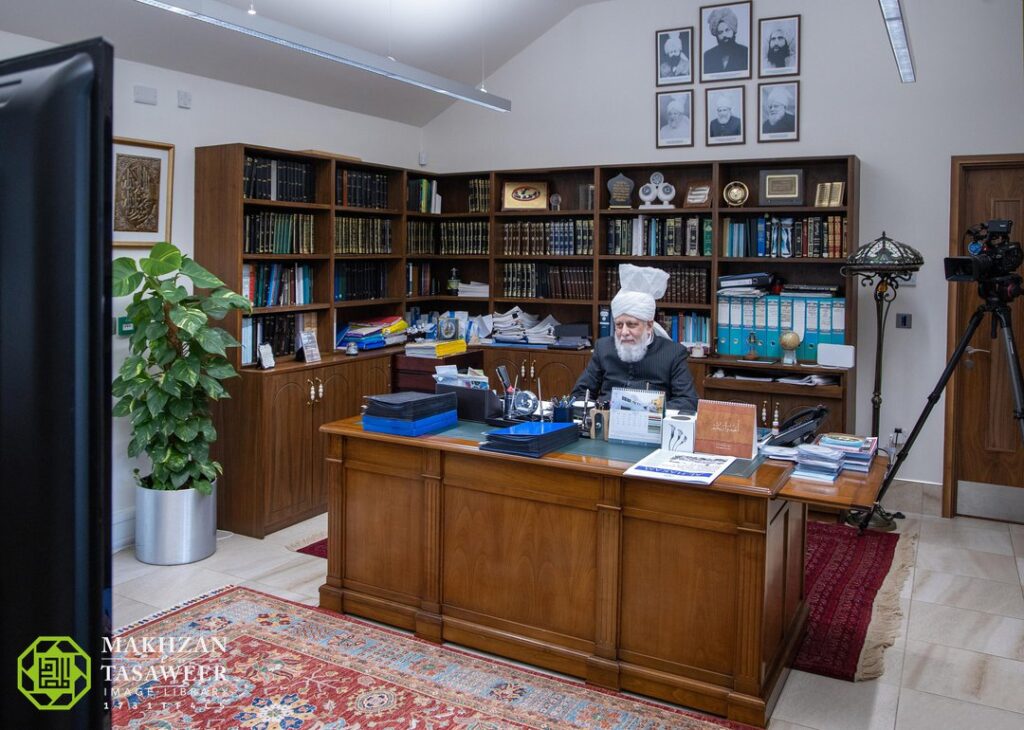
His Holiness gives guidance on a wide array of administrative and religious matters On 20 February 2021, the National Majlis-e-Amila (Executive) of the Ahmadiyya Muslim Community Nigeria were granted a virtual official meeting and audience with the World Head of the Ahmadiyya Muslim Community, the Fifth Khalifa (Caliph), His Holiness Hazrat Mirza Masroor Ahmad for the very first time. Also present were the principals of Ahmadiyya Muslim Schools in Nigeria, doctors serving in the Ahmadiyya Muslim Hospitals in Nigeria and Missionaries serving in the country. His Holiness presided the meeting from his office in Islamabad, Tilford, whilst the Amila members joined the meeting virtually from the Lajna Hall in Ojokoro in Lagos, Nigeria. During the almost 60-minute meeting, all present had the opportunity to speak to His Holiness and to receive the guidance and instructions of His Holiness on a range of issues. Speaking to the National Talim Secretary, responsible for the Education of the members of the Ahmadiyya Muslim Community in Nigeria, His Holiness said that the department should guide Ahmadi Muslim students throughout their education. Hazrat Mirza Masroor Ahmad said: “You should form a counselling and guidance committee. The purpose of the committee will be to guide and counsel the students who are secondary school-going students and guide them what further education they can pursue according to the local conditions and the local requirement.” His Holiness also advised the National Tarbiyyat Secretary, the secretary responsible for the moral training of Ahmadi Muslims, to ensure Ahmadi Muslims living in Nigeria were observant of all Islamic teachings. Hazrat Mirza Masroor Ahmad said: “Each and every Ahmadi Muslim should be very particular and punctual in offering five times daily prayers, should be very particular in reciting the Holy Quran, should be very punctual and regular and particular in reading some books of Hadith and of the Promised Messiah (peace be upon him). You should prescribe some book also for the members of the Ahmadiyya Muslim Community that they can read – those books which have been translated into English – so they can read and know what the purpose of the advent of the Promised Messiah (peace be upon him) is; what did he say, what does he want from us and how an Ahmadi Muslim should behave.” Hazrat Mirza Masroor Ahmad further stated: “If the Tarbiyyat department is active and you have done your job appropriately and in the best manner, then quite a number of other departments will run smoothly.” His Holiness also instructed that in each and every chapter of the Ahmadiyya Muslim Community in Nigeria there should be a local missionary and so, His Holiness said, a detailed plan should be made in this regard to outline how to train missionaries to fulfil this target. Furthermore, His Holiness said that every Amila member should commit their time for a two-week Waqf-e-Arzi period whereby the Amila members dedicate their time for helping teach the Holy Quran to the members of the Ahmadiyya Muslim Community or to convey the message of Islam to the wider public. As the meeting concluded, Hazrat Mirza Masroor Ahmad prayed for the attendees and said: “As I have already guided some of the secretaries, they should work hard according to my instructions and identify where you are lagging behind and see how you can improve. May Allah the Almighty bless you all.”
Fighting Hunger this Ramadan

By Frasat Ahmad – Missionary of the Ahmadiyya Muslim Community, serving in USA Our world works in strange dichotomies and stark contrasts. Gluttony and starvation, for example, exist hand in hand today. In one part of the world, a plump child stuffing his mouth with food runs the risk of a plethora of health complications, while in another part of the world, a starving child with a skeletal body desperately desires food. Right now, 820 million people across the world are wondering where their next healthy meal will come from. Where does Ramadan fit into all of this? From today, hundreds of millions of Muslims will choose to forego their meals every day, from dawn to dusk, for a month, for the Muslim holy month of Ramadan is upon us. As our stomachs singe in hunger, Muslims are reminded that hundreds of millions of starving souls are forced to feel this burn every single day, with no end in sight. Have you ever wondered why we are taught that the gates of Paradise are opened in Ramadan, whilst the gates to Hell are closed? Perhaps our paradise lies in putting ourselves through a form of temporary torment and putting ourselves in the shoes of those less fortunate. We are taught that we can shield ourselves from Hell, even by giving half a date in charity. Muslims know well that the Prophet Muhammad’s (sa) generosity in Ramadan would gain the intensity of fierce wind. But are we putting this into practice? It is a powerful lesson to learn. As we unashamedly fill our plates to the brink with delicious food, we must remember those who haven’t even had a bite to eat in days. As we unbuckle our waist belts to give room to our bursting bellies, we must think about those who have to tighten their waist belts because they have no food to eat. And as they tighten their waist belts, we must not tighten our fists. It is what Prophet Muhammad (sa) taught. God Almighty will one day ask us, “O son of Adam, I asked you for food and you fed Me not. Did you not know that had you fed my servant, you would surely have found Me with him?” (Muslim) It is also what the Second Coming of Christ, Hazrat Mirza Ghulam Ahmad (as) taught: “You should show love and compassion to all people. Allah commands us to feed the hungry, free those shackled in bondage, pay off the arrears of those mired in debt, shoulder the burdens of others and fulfil the rights of sincere love owed to mankind.” These words must not fall upon deaf ears. Empty rituals to remain hungry will serve no good unless they are paired with practice. On 10th April, 2020 Friday Sermon, Hazrat Khalifatul Masih V, Hazrat Mirza Masroor Ahmad (may Allah be his Helper) stated: “For these are indeed the days to serve humanity; and as the Promised Messiah (as) has instructed, ‘You must inculcate within yourselves the spirit of compassion.’ Again, these are the days to serve humanity.” Thankfully, the Ahmadiyya Muslim Community worldwide has not turned a blind eye to these instructions. Its USA Youth Association served more than 22,500 meals to the needy and helped 3,400 families with free food and medicine delivery in March alone. Its Youth Association in UK has thus far helped 5,800 households, providing them with food and medicine, alongside supporting 43 local councils, charities and food banks. And other countries are following suit. Pandemic or no pandemic, the followers of the Promised Messiah (as) will forever continue to “bandage the wounds of those in pain, to remove the anxieties of those who are distressed and to show love and compassion without any desire for recognition or worldly reward.”
A Conversation with Qamar Suleman sahib

By Abid Khan Introduction Over recent weeks, we have been told time and time again that we are living in ‘unprecedented times’. Despite the media’s propensity to exaggerate or sensationalise, this time their assertion feels right. Unlike Ebola or Zika or other viruses that caused panic and fear in recent years, Covid-19 has not been limited to a few nations or a particular region but has spread far and wide and, at the time of writing, is continuing to place much of the world in a state of paralysis. Speculative green shoots indicating light at the end of what has been a very dark tunnel are slowly starting to emerge, wherein some countries are hopeful that the peak of the pandemic may have been reached. However, in reality, it is far too early to say and fears of a deadly second or third or even a fourth wave abound. The virus has also had substantial effect on the activities of the Ahmadiyya Muslim Community. Jamaat events have been cancelled or postponed across the world. We have entered Ramadan unable to visit our Mosques. Yet, with the Grace of Allah, the direct link of Ahmadi Muslims with Khilafat continues through Huzoor’s Friday Sermon, which continues to be broadcast on MTA International – albeit in an empty Mosque for the time being. Almost every Ahmadi I have spoken to has said they have learned, above all, during this period that we must never take the blessings of Allah the Almighty for granted ever again. Each year, at this time, many preparations for the Jalsa Salanas in the UK and Germany begin in earnest. Yet, currently it remains entirely unclear when or if it will be possible for them to take place. Time will tell. Till then, I wish to share some memories of last year’s Jalsa UK and Jalsa Germany in the coming weeks. I start with a conversation I had with Syed Qamar Suleman sahib, Wakil Waqf-e-Nau, who attended the 2019 Jalsa Salana UK as an official representative of Tehrik-e-Jadid Pakistan. As the son of (late) Sahibzada Mir Daud Ahmad sahib and (late) Sahibzadi Amatul Basit sahiba, Syed Qamar Suleman is a member of the family of the Promised Messiah (as) and the maternal grandson of Hazrat Musleh Maud (ra). He is also the cousin of Hazrat Khalifatul Masih V (aba). Qamar Suleman sahib, affectionately known as ‘Babbi’, to his friends and family, is also a relative – my Khaloo – the husband of my maternal aunt, Lubna Amatul Kabir, who also travelled to attend last year’s Jalsa. One of my earliest vivid childhood memories is of waking up one morning in the late 1980s to see my mother, (late) Sajida Hameed, panicked as news reached us that Khaloo Babbi had been shot by a burglar at his home in Rabwah. Thankfully, with the Grace of Allah, he recovered well. Furthermore, in the early 2000s, I spent some time with him during personal visits to Pakistan. In fact, he was the person who somehow persuaded me to take hold of a menacing looking snake and to abseil from a rather steep Rabwah mountain. Last summer, I took the opportunity to speak to him about his personal opportunities to observe Khilafat and some of the lessons he had learned during decades of service to the Jamaat. Childhood memories As we spoke, I asked Qamar Suleman sahib to share his memories of Hazrat Khalifatul Masih V (aba) as a child. He told me how they had competed in Atfal competitions and how he remembered one particular competition about cleanliness in which Huzoor came first. He also reminisced about having had the opportunity to do overnight security duties with Huzoor in Rabwah during their late teenage years and early twenties. He told how he had been on walks with Huzoor to Ahmad Nagar, farmland near Rabwah, and how it would sometimes suddenly start pouring with rain. Instead of being perturbed, he told me that Huzoor would enjoy the rain even if he became drenched. As he told me these stories, I wished I could have been there as a boy to see and know Huzoor during his formative years. (Qamar Suleman sahib meeting Hazrat Khalifatul Masih V (aba) in Canada 2016) Qamar Suleman sahib said: “During childhood I saw Huzoor a lot as our families were close relatives and neighbours. Huzoor’s defining feature at that time, which made him stand apart from other children, was that he was mature beyond his years and whatever task or job he was given he would take seriously and complete it with diligence. Unlike most teenagers or youngsters who get excited or do things in haste, I always found that Huzoor approached things in a calm and meticulous way. Furthermore, even in our childhood and teenage years, I always found that there was weight to the words of Huzoor, even though he was a young boy like us.” Qamar Suleman sahib continued: “I am not saying that Huzoor was always serious or reserved. In fact, he displayed a very good sense of humour but his jokes were always decent and would never cross the bounds of decency or appropriateness. Furthermore, unlike some other children, Huzoor never made a cruel joke or spoke in a way that could hurt the feelings of others. This was something that always marked him apart.” A different relationship After listening to his youthful memories, I asked whether his relationship with Huzoor had changed with the progression of time. In answer, Qamar Suleman sahib said: “I continued to have the opportunity to spend time with Huzoor in the years after he returned to Pakistan from Ghana. For example, once we travelled together along with two other people from Rabwah to Sindh by train. It was an extremely enjoyable journey in which the four of us booked a carriage on the lower level of the train. I recall that a Jamaat Murrabi (Missionary) also happened to be on the train but he had booked a seat on the upper level. The Murrabi was rather heavy-set and
